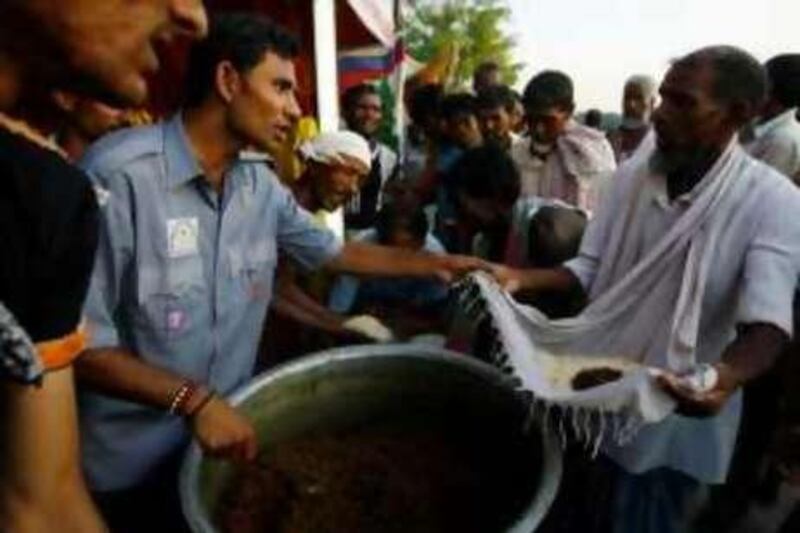CHILMILIA, INDIA // Three weeks after India's eastern state of Bihar suffered its worst flood in half a century, some Muslim villages in the worst-affected areas say they have yet to receive any aid, and accuse the government of discrimination.
Local officials warned villagers yesterday against returning to their homes saying the threat of further flooding was still great due to the ongoing monsoon in Nepal and eastern India. The government has evacuated nearly one million people from the region after the Kosi river flowing from Nepal breached its defences and flooded parts of Bihar, India's poorest state. But some Muslim villagers in the three worst-hit districts of Supaul, Araria and Madhepura claim they are being denied access to relief because Bihar's ruling National Democratic Alliance is a key ally of the powerful BJP, a Hindu nationalist party. The government has denied the accusations and said it is working hard to ensure that all residents are well cared for, including providing food for Muslims to break their Ramadan fast.
Mohammed Israil, 50, a Muslim from Lalpur Got village in Supaul, said he waited for nine days for help after his bamboo and hay-thatched house was submerged by up to 1.5 metres of flood waters on Aug 18, before striking out on his own. "While seven of my children and my wife were perched on top of the crumbling roof and on a tree in the submerged courtyard, I, standing in chest-deep water and carrying my two youngest daughters on my shoulder, shouted at almost empty army [rescue] boats which were passing by. They said they would pick us up on their way back. But they never came to us," said Mr Israil, a day wage farm labourer.
When the boat did return, Mr Israil said, it was full of Hindu villagers from neighbouring Malkushar and other villages. "I am convinced they [army rescuers] did not want to help the Muslims. Hindus and Muslims both are victims - they should have helped both communities. From the minarets of our mosque and from my beard, they knew we were Muslims and so they ignored our calls, I think." On the 10th day, the villagers in Lalpur Got decided to take matters into their own hands and, using 12 empty plastic barrels, crafted two rafts that could carry them out of their village. In this way, hundreds were ferried 12km down the road to Muslim-majority Araria, where they say they are still waiting for government help.
"My house and foodgrain stock was washed away; government and army rescue boats did not respond to our calls for help as they passed by. About 300 of us finally fled our village on rafts. We had no money and with our children and women we walked 30km to catch a train to this town," said Mohammed Ainul, sitting in a madrasa in Araria, along with 650 flood victims. "We left our villages because we were going hungry. But even in this town where government officials are present, I am doing with my suhoor with just a glass of water and iftar just with one handful of puffed rice," he said.
According to Shan Mohammed of Muslim Aid, about 3,000 Muslims are living in four relief camps in Araria. It was estimated that up to 800,000 Muslims were badly affected by the floods. Muslims make up about 15.7 per cent of Bihar's 83 million population. But despite the government's warnings to residents to evacuate their homes, many Muslims, on hearing that relief is being denied, are refusing to leave their flood-ravaged villages of Chilmilia, Ghazinagar, Patarwah and Shankarpur, in the districts of Supaul.
"Not one rupee or one grain of rice or a paracetamol tablet has been sent to us in aid while we are just 15km away from the main road," said Mohammed Akhtar Alam, 65, the chief of the cluster of the four Muslim villages. "Our sons and daughters who left for the towns in the hope of relief have been kicked by the government. I have asked them to return to the villages. We all will die here, in our village," he said.
"We don't have any hope in this government, which has deliberately kept Muslims away from their relief network. We have Hindus in our neighbouring villages and we always had an excellent close-knit relationship. The government, with political interest, just to keep the Hindus united, has separated them from us at this opportunity." Like most parts of Hindi-speaking India, Bihar is also communally volatile. In 1989 Hindu-Muslim riots in Bhagalpur city left about 1,070 people dead, about 900 of whom were Muslims.
Sashi Bhushan Pathak, the officer in charge of relief in Supaul, denied accusations that Muslims were intentionally being denied help, but acknowledged that there were some difficulties in getting aid to remote villages. "It is true that some villages of my district, lying in border areas, have not got any relief. Many roads to some border areas have been washed away hampering our relief work ? Villages being excluded by relief workers just because they are Muslim is baseless."
Mr Alam said he had not lost hope. "We think this hardship is a test of our imaan and it is a good opportunity to show our faith in Him. That is why we have chosen not to ignore our fast during Ramadan, although we are homeless." * The National





